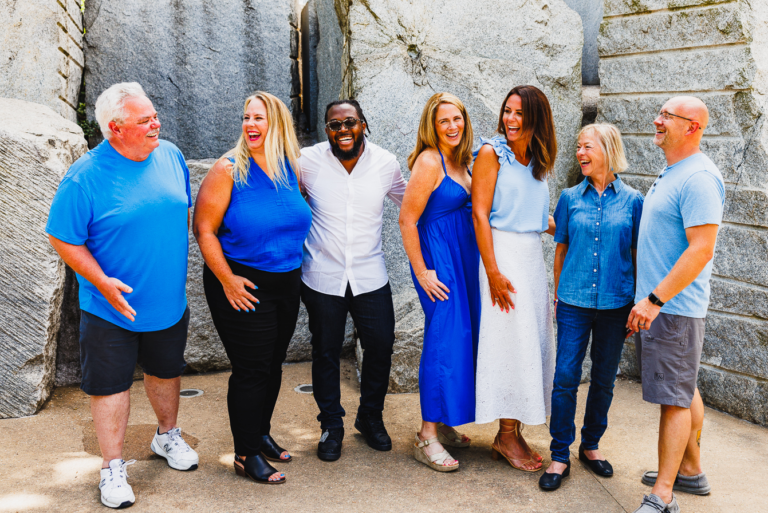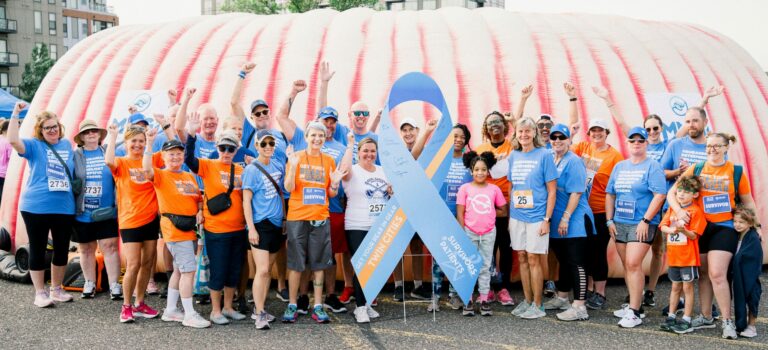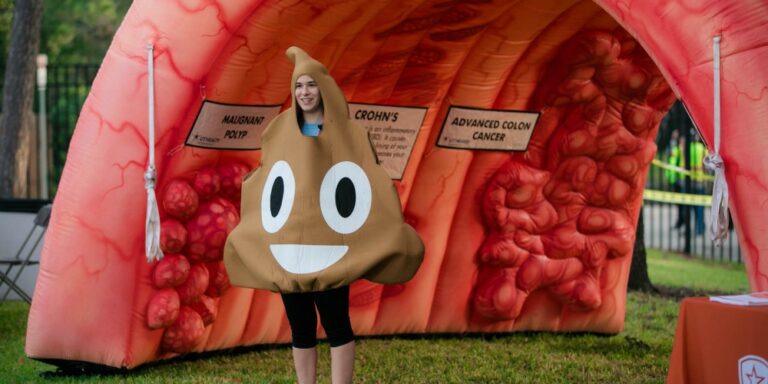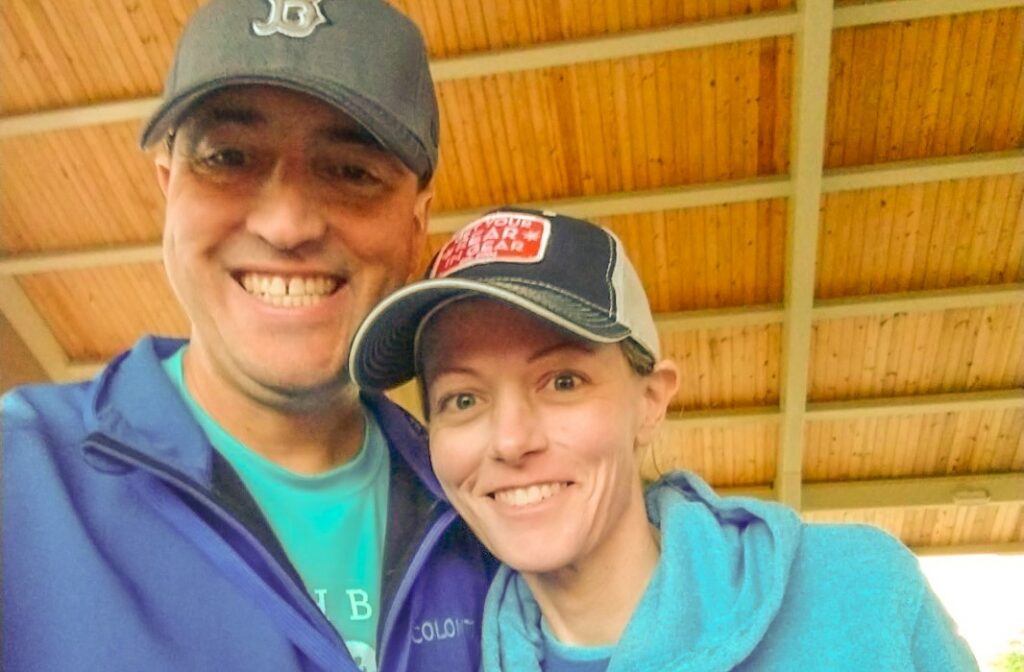
EDITOR’S NOTE: Howard Brown lives in Detroit, MI. He is a stage IV colorectal cancer patient, currently NED, advocating for colorectal cancer screening and awareness. He serves on the board of directors for the Paltown Development Foundation, the parent and funder for COLONTOWN, a partner of the Colon Cancer Coalition. Howard also is a scientist survivor with the American Association of Cancer Research and a part board President for the AJC Detroit, working on interfaith and inter-ethnic relations in Detroit, among many other leadership roles. As Rosh Hashanah approaches (beginning in the evening of Friday, September 18 and ending in the evening of Sunday, September 20), we are honored to have Howard’s reflections on who will be written in the Book of Life, and how his faith collides with his survivor’s guilt in the wake of several close friends and high-profile deaths from the very disease that has impacted his family. You can read Howard’s personal journey in previous Faces of Blue entries HERE and HERE.
Guest post by Howard Brown
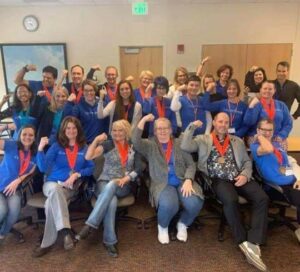
COLONTOWN
When you’re healthy, you may not think twice about a question like: “Who shall live and who shall die?” For Jews, this is a central question of the High Holy Days: a small yet powerful string of words among the hundreds of traditional words we pray, chant and contemplate between Rosh Hashanah, the Jewish New Year, and Yom Kippur, the Day of Atonement.
Right now, millions of Jewish families are looking forward to the start of Rosh Hashanah. It’s a happy yet solemn time of year—an eagerly awaited opportunity for spiritual renewal and family reunions. While services and dinners may be virtual this year, the themes of life and death remain as they have for centuries. Between Rosh Hashanah and Yom Kippur, Jews take stock of their actions over the past year, ask for forgiveness to those they have wronged and vow to do better. God ponders who shall live, or be inscribed in the Book of Life, and who shall die by the close of Yom Kippur.
This year, millions more are pondering those sacred words, with the total of global cases of COVID-19 approaching 30 million and deaths nearing a staggering 900,000.
Who Shall Live and Who Shall Die.
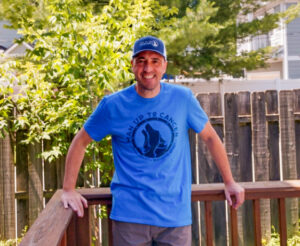
Howard Brown
Who else hears those solemn words in the service each year with high anxiety and often with broken hearts? Anyone who struggles with cancer in their own life or in the lives of loved ones. Believe me: For more than four years now, I have felt those words leap off the page at me. I have moved from a diagnosis of stage III in 2016 to stage IV metastatic colorectal cancer with “3-6 months to live” the following year —to a patient determined to beat this disease in 2018—to rebuilding my life and celebrating my survival in 2019—to becoming a national advocate for all those who continue to suffer cancer’s effects currently.
“Who shall live and who shall die?” There is more than a simple annual tally in that question. It’s a deep question each of us struggles to answer every day.
This story is my story, but also about some friends I met along the way—like the remarkable “cancer whisperer” and activist Sarah DeBord. It’s their story as much as it is mine. But—perhaps like your own life’s story—mine began as a surprise. I was diagnosed with stage III colon cancer after my 50th birthday in June of 2016. (Read Howard’s journey HERE and HERE.)
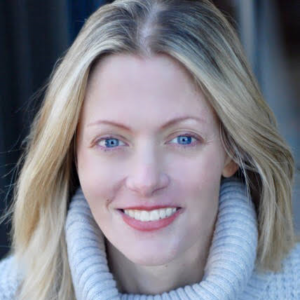
Sarah DeBord
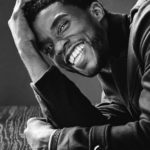 After my diagnosis my thoughts were speeding 100 miles per hour: What if the screening age had been lower!?! Could my story have been different? And, finally after years of advocacy work, American Cancer Society has dropped screening recommendations from 50 to 45. Even now I think it needs to move even lower as rates of younger-onset colon cancer is growing. The death of Chadwick Boseman at age 43 (Black Panther star) has become a national wake-up call to younger adults.
After my diagnosis my thoughts were speeding 100 miles per hour: What if the screening age had been lower!?! Could my story have been different? And, finally after years of advocacy work, American Cancer Society has dropped screening recommendations from 50 to 45. Even now I think it needs to move even lower as rates of younger-onset colon cancer is growing. The death of Chadwick Boseman at age 43 (Black Panther star) has become a national wake-up call to younger adults.
Nothing in Life is Guaranteed.
“Get your affairs in order.” I heard those unimaginable words. My life span was constricted to a 4% chance of surviving 18 months. My daughter Emily had just completed her sophomore year in high school. My wife Lisa and I had just celebrated our 23rd wedding anniversary.
I had beaten stage IV Non-Hodgkin’s Lymphoma cancer when I was in my early 20s. Then, I had started out more passive, like a deer in the headlights. This time, I set out on that long, painful journey like a Marine on a mission—assembling my support team, relying on the strength of my amazingly supportive wife, family and large social media network, determined to kill cancer rather than letting it kill me.
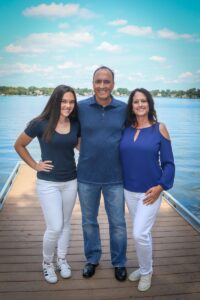
with his wife, Lisa, and daughter, Emily
Still, to be honest, there were those agonizing questions. Would I live to see Emily graduate high school? To grow old with Lisa? I am living out the ancient wisdom: Nothing in life is guaranteed and our tenure on earth is a short one.
And, now, another autumn after another as we—as cancer patients and care partners—struggle through surgeries, procedures, chemotherapy treatments and all kinds of crazy side effects, there come those inevitable lines in the Rosh Hashanah and Yom Kippur services: Who shall live and who shall die?
To date, I survive. This year, when I hear those words in the annual prayers, I’m more confident for myself. I’ve been NED (No Evidence of Disease) for four quarters. So, are those words less solemn for me? Less freighted with emotion? Easier to roll past me as the holidays come and go?
No. And the reason is: When coping with cancer, we learn that we cannot do this alone. We learn to lean on others, to depend on others—and eventually to reach out and let others lean on us, depend on us. And, in doing so we unwittingly sign up for a terrible toll we all know so well—the loss of fellow cancer patients.
Survivor’s Guilt.
The question quickly becomes: Why am I alive and great people like my dear friend Sarah DeBord have died—just recently—after the most courageous and inspirational eight-year battle with colon cancer? I did get to see Emily graduate and I’m eagerly looking forward to the next milestones I will enjoy with her and Lisa. But Sarah just left behind her devoted boyfriend and two precious young boys.
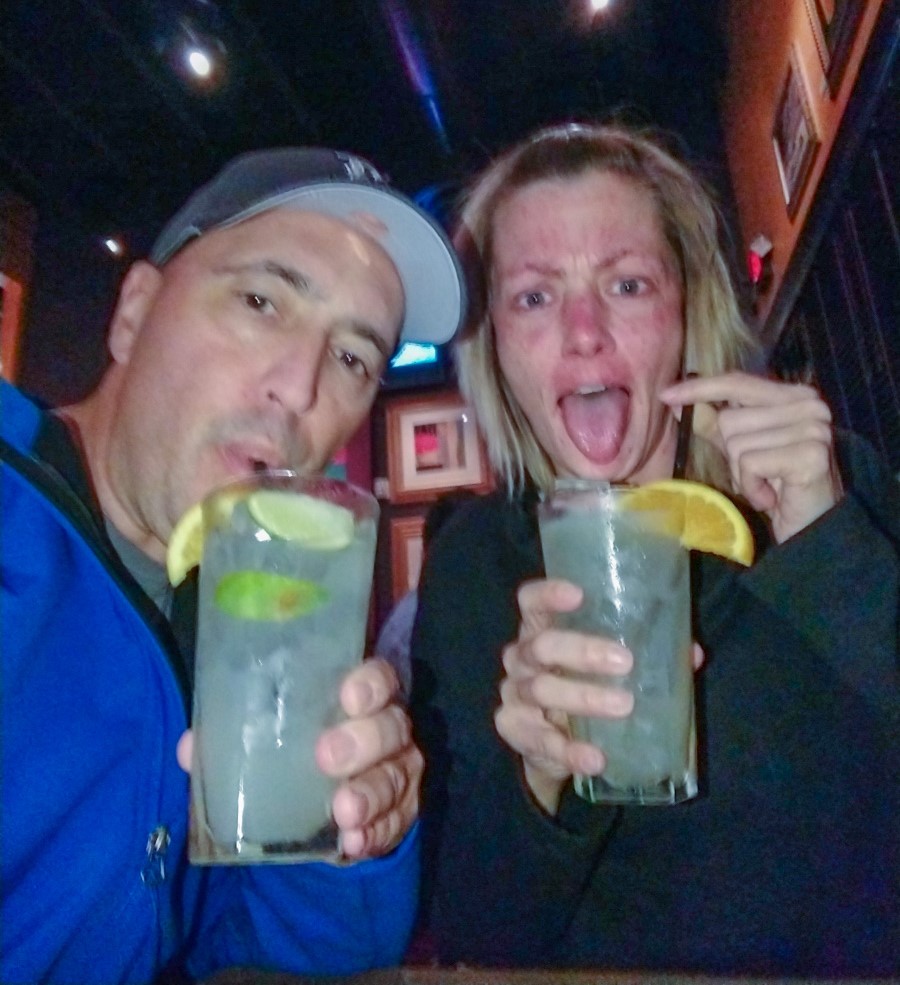
Sarah was “a cancer whisperer” to me and so many others. Her life had such meaning! So many people depended on Sarah; and she graciously welcomed that. I keep asking: Why did Sarah die? Why am I still here? And, yes, I understand that we call this “survivor’s guilt” and it’s common among us. But that still doesn’t answer the questions that keep rattling around in our hearts.
I met Sarah DeBord in Denver at a Colontown.org, Empowered Patient and Caregivers Conference in October of 2018. I randomly sat next to her, but I had heard of her, and had read her Colon Cancer Chick blog. Sarah was a social media powerhouse, working in marketing communications for the Colon Cancer Coalition. The baseball World Series was on and we watched “my” Boston Red Sox play “her” Los Angeles Dodgers that evening.
Violet Kuchar, who is also now deceased, and Dr. Chelsea Boet also joined us and we Facetimed with Stacy Hurt in Pittsburgh. This group of stage IV women and myself formed a private group to share, support and send virtual hugs to each other as we each faced chemotherapy, surgeries, clinical trials and side effects galore. So much darkness was heaped upon our families—psychologically, financially, physically.
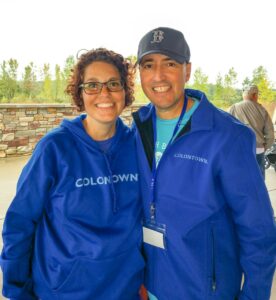
with Dr. Chelsea Boet
My next meeting with Sarah was at Get Your Rear in Gear® in Grand Rapids, MI, in September 2019. The chair was Dr. Chelsea Boet and her family – “Team Chelsea.” The next day I got to spend all day volunteering.
Sarah was tired and frail, but at 95-pounds was tough as nails. At the end of the day I spent some quiet time that ended with a hug and some good-natured ribbing about my Red Sox’ World Series win over her Dodgers. I told her to hug her boys, she told me to hug my girls and left for the two-hour drive home not knowing that I would never see or hug Sarah again.
Death is a part of Life.
Who shall live and who shall die? As I think about those words this year, I’m overwhelmed with memories of Sarah and Violet. They’re gone. Meanwhile, Stacy and I are grateful for achieving NED but have much farther to go to get away from this crappy disease. Dr. Chelsea is in active treatment and still fighting her fight. It is an unfortunate fact the we see far too much death following a stage IV metastatic cancer diagnosis.
What that ancient question in the prayers reminds me of each year, is that I do not have any say in the matter. I struggle with Violet and Sarah passing—and I may never be over this loss. I cry every day that I cannot message, text, or call them. I hope somehow that they know in heaven that they are missed so dearly, so whole heartedly by me and so many.
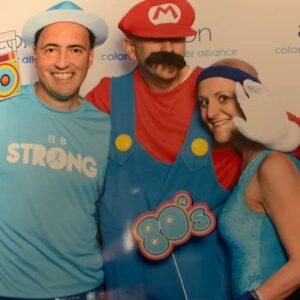
with Violet Kucher and another friend
What that ancient question reminds all of us is: Men and women have been asking these questions—and crying these tears—for thousands of years. Death is a part of life. Death humbles all of us. And, even knowing that, death remains such a blow when it comes because we dare to love each other and help each other—especially those of us who build these daily bonds as cancer whisperers.
In this new year—Jews number it 5781—who shall live and who shall die?
I do not know. Only God knows. What I do know is that I can remember each life. I can retell the stories as I have just done. And that’s ultimately the purpose of the prayers we read and chant and sing at the High Holy Days. We can learn and grow from our challenges and the example of other cancer patients. We pass along our hard-earned wisdom. We remember. We can tell and retell the inspiring stories we shre. We pray together. We hope together. We recommit ourselves to keep on loving as long as we live.
And, this year, when I hear those words twice—on Rosh Hashanah and Yom Kippur—I can say: “O God, may their names remain a blessing to those of us who knew and loved them.”
A version of this article was published simultaneously with ReadtheSpirit, an online magazine and a network of writers connecting readers with voices in religion, spirituality, interfaith, and cross-cultural issues.

